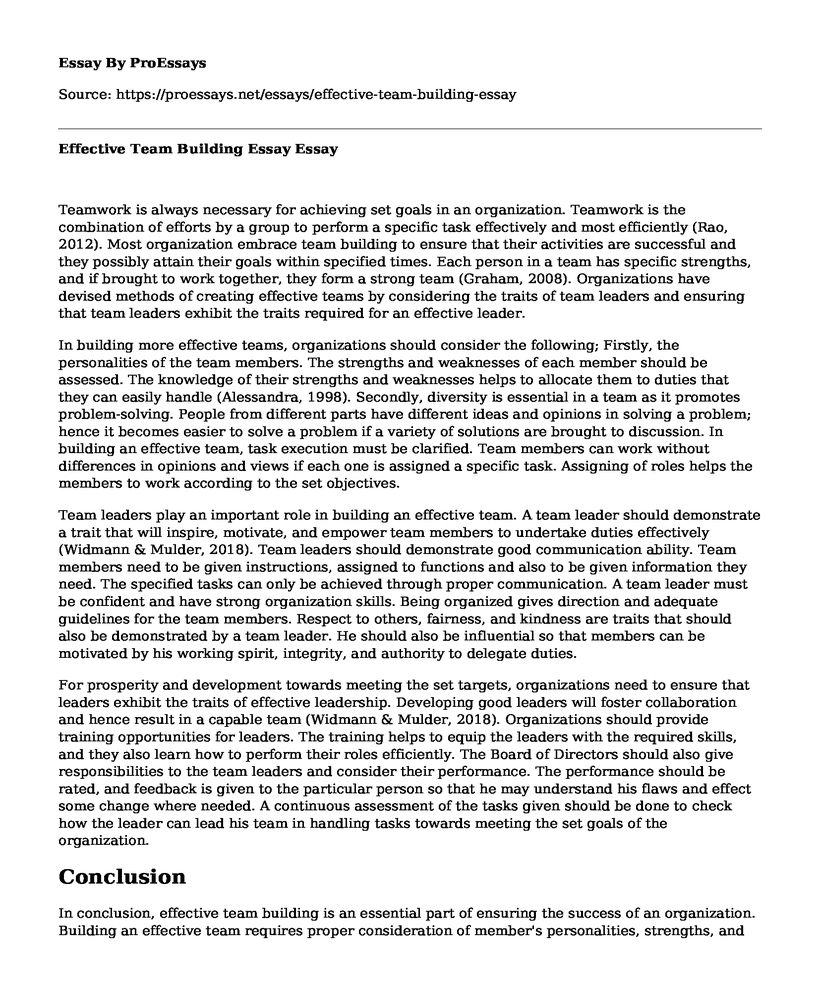Teamwork is always necessary for achieving set goals in an organization. Teamwork is the combination of efforts by a group to perform a specific task effectively and most efficiently (Rao, 2012). Most organization embrace team building to ensure that their activities are successful and they possibly attain their goals within specified times. Each person in a team has specific strengths, and if brought to work together, they form a strong team (Graham, 2008). Organizations have devised methods of creating effective teams by considering the traits of team leaders and ensuring that team leaders exhibit the traits required for an effective leader.
In building more effective teams, organizations should consider the following; Firstly, the personalities of the team members. The strengths and weaknesses of each member should be assessed. The knowledge of their strengths and weaknesses helps to allocate them to duties that they can easily handle (Alessandra, 1998). Secondly, diversity is essential in a team as it promotes problem-solving. People from different parts have different ideas and opinions in solving a problem; hence it becomes easier to solve a problem if a variety of solutions are brought to discussion. In building an effective team, task execution must be clarified. Team members can work without differences in opinions and views if each one is assigned a specific task. Assigning of roles helps the members to work according to the set objectives.
Team leaders play an important role in building an effective team. A team leader should demonstrate a trait that will inspire, motivate, and empower team members to undertake duties effectively (Widmann & Mulder, 2018). Team leaders should demonstrate good communication ability. Team members need to be given instructions, assigned to functions and also to be given information they need. The specified tasks can only be achieved through proper communication. A team leader must be confident and have strong organization skills. Being organized gives direction and adequate guidelines for the team members. Respect to others, fairness, and kindness are traits that should also be demonstrated by a team leader. He should also be influential so that members can be motivated by his working spirit, integrity, and authority to delegate duties.
For prosperity and development towards meeting the set targets, organizations need to ensure that leaders exhibit the traits of effective leadership. Developing good leaders will foster collaboration and hence result in a capable team (Widmann & Mulder, 2018). Organizations should provide training opportunities for leaders. The training helps to equip the leaders with the required skills, and they also learn how to perform their roles efficiently. The Board of Directors should also give responsibilities to the team leaders and consider their performance. The performance should be rated, and feedback is given to the particular person so that he may understand his flaws and effect some change where needed. A continuous assessment of the tasks given should be done to check how the leader can lead his team in handling tasks towards meeting the set goals of the organization.Conclusion
In conclusion, effective team building is an essential part of ensuring the success of an organization. Building an effective team requires proper consideration of member's personalities, strengths, and weaknesses to produce a good combination of efforts in achieving a goal. Team leaders should demonstrate traits that are motivational and inspiring to the members to foster collaboration aimed at attaining the set targets by the organization. Therefore, it is prudent that organizations invest in ensuring that team leaders exhibit traits of an effective leader.
References
Alessandra, T. and O'Connor, M.J. (1998), The Platinum Rule: Discover the Four Basic Business Personalities and How They Can Lead You to Success, Warner Business Books, New York, NY.
Graham, J. (2008). The seven habits of highly effective salespeople. Industrial Distribution, 97(2), 33-n/a. Retrieved from https://docview/204973131?accountid=45049
Rao, M.S. (2012), 21 Success Sutras for Leaders, 1st ed., Pearson.
Widmann, A., & Mulder, R. H. (2018). Team learning behaviors and innovative work behavior in work teams. European Journal of Innovation Management, 21(3), 501-520. doi:http://dx.doi.org/10.1108/EJIM-12-2017-0194.
Cite this page
Effective Team Building Essay. (2022, Feb 16). Retrieved from https://proessays.net/essays/effective-team-building-essay
If you are the original author of this essay and no longer wish to have it published on the ProEssays website, please click below to request its removal:
- Management Essay Example: Shaping Cultures and Ethics of the Organization
- Analysis of Apple Case Paper Example
- Transformation of the IT Department Into a CIO Organization Paper Example
- Foothill College Director Interview Example
- Essay Sample on Target's Stakeholder Relationships
- Essay on Delegating Duties for Sick Leave: 6 Steps for Growing Companies
- Annual Reports: Financial Performance & Strategic Plans for Shareholders & Stakeholders - Essay Sample







